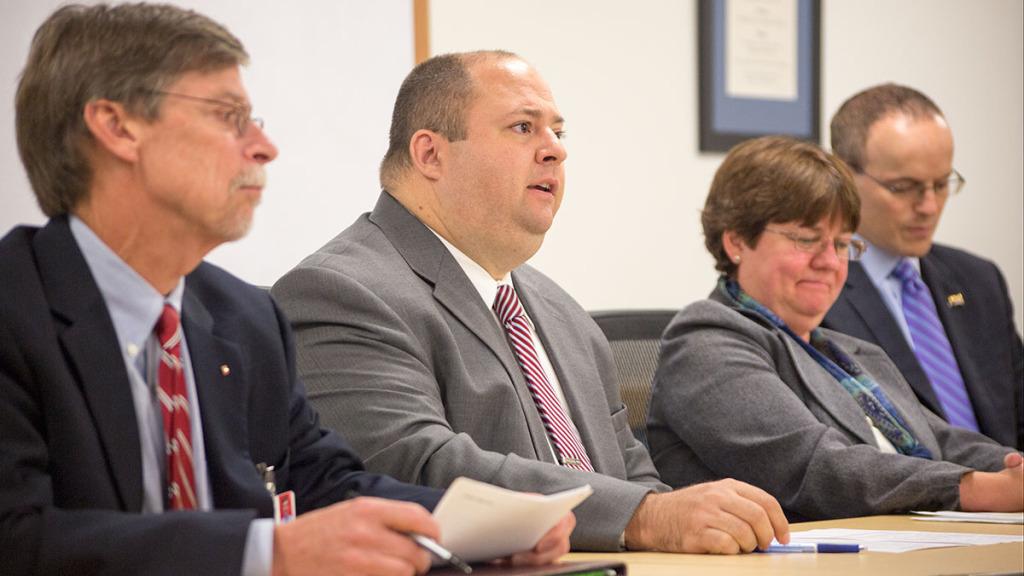The Ebola outbreak in West Africa is causing the international community to react to the potential spread of the virus to other countries and has inspired local communities to follow suit.
State and local Health departments began preparing for further potential Ebola outbreaks after three people in Dallas, Texas, became infected, including Thomas Duncan who died shortly after contracting the virus, and the latest Ebola patient, Doctor Craig Spencer, was diagnosed with the virus in New York City.
A coalition of academics, health care professionals and first responders in the Tompkins County area announced the region’s active response plan for the unlikely chance of an Ebola case in the region at a media roundtable at the Tompkins County Health Department on Oct. 21. The coalition includes the Tompkins County Health Department, Cayuga Medical Center, Ithaca College, Cornell University, Tompkins Cortland Community College, the Tompkins County Department of Emergency Response and other first responders.
The coalition is responding to the Centers for Disease Control and Prevention’s new medical guidelines released on Oct. 20 for health departments and officials across the country and is implementing these guidelines into its preparedness action plan.
With international students attending Ithaca College, Cornell University and Tompkins Cortland Community College, the three schools have been involved in the Ebola response plan for the area by informing students, faculty and staff of any travel restrictions while monitoring those who may have been in the affected areas.
Vivian Lorenzo, director of medical services at Hammond Health Center, said no student, staff or faculty member has recently travelled from the suspected West African countries, but if someone were suspected to have Ebola at the college, the Health Center would be able to take the initial steps to assess the person.
“We are following the recommended screening protocols, and we have personal protective equipment that we would use if we had someone here that we thought was a suspect Ebola case,” Lorenzo said. “We would be very unlikely to be doing any lab work up or managing any patient with suspect Ebola here.”
The U.S. Department of State issued an alert Oct. 22 placing Guinea, Sierra Leone and Liberia on the travel warning list, restricting travel to specified screening locations. The college does not support travel to countries on this list, according to a statement that Hammond sent to the student body on Oct. 22.
The CDC is requiring three designated rooms in the isolation area for the individuals looking after the patient. The first will be where staff will change into protective gear, and the second is an anti-room staff go through before entering the third room where the patient will be.
Frank Kruppa, Tompkins County Health Department public health director, said the Tompkins County coalition was formed in early August after the first positive confirmation of a patient having symptoms of Ebola in the United States.
“We’ve been meeting regularly with that larger group that we described to talk about plans that are in place, to answer questions that the organizations might have and to begin to inventory what our community has available from a resource standpoint,” Kruppa said.
John Rudd, president and CEO of the CMC, said the hospital has isolation rooms ready for treating a potential patient with Ebola and is prepared to build more in preparation for an outbreak.
“Things are changing as we speak daily, and we are continuing to monitor what is coming out of the CDC and what is coming out of the New York State Health Department to ensure we are on top of the recommendations made and the training occurs in compliance with those recommendations,” Rudd said.
At the request of the New York Department of Health, the CMC recently joined other New York state hospitals for emergency management training and Ebola readiness. Rudd said the CMC staff ran a hypothetical scenario where an individual came into the hospital identifying as having contracted the disease before the staff isolated the patient to ensure the correct treatment and protocol were followed.
David Evelyn, vice president of medical affairs at the CMC, said the hospital’s current isolation precautions will have to be updated to include more isolation rooms following the most recent guidelines from the CDC.
Janet Corson-Rikert, associate vice president and director of health services at Cornell University, said though Cornell is monitoring people who could have potentially been exposed to the virus, it is very unlikely for Ebola to be confirmed on campus.
Kruppa said Ebola will most likely not spread to upstate New York, but that Tompkins County is ready should it occur.
“Our community and our partner groups have been working together to prepare and coordinate our potential responses if necessary, and they should feel comfortable in the understanding that we are communicating well, we are working well together and we are putting together all the appropriate planning,” Kruppa said.








